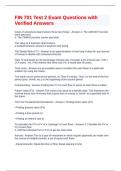-
1. Exam (elaborations) - Acct 701 chapter 10 in a set of financial statements, what information is conveyed ab...
-
2. Exam (elaborations) - Acct 701 end of chapter 6 exam questions and answers
-
3. Exam (elaborations) - Acct 701 lsus exam questions with latest update
-
4. Exam (elaborations) - Acct 701 lsus- module 6 homework exam questions with latest update
-
5. Exam (elaborations) - Acct 701 lsus week 1 exam questions and answers
-
6. Exam (elaborations) - Acct 701 module 1 exam questions and answers
-
7. Exam (elaborations) - Acct 701 true or false multiple choice exam questions and answers
-
8. Exam (elaborations) - Bulm 701 quizzes 1-3 exam questions with verified answers
-
9. Exam (elaborations) - Cfa analyst prep corporate finance exam questions and answers
-
10. Exam (elaborations) - Chapter 8 finance exam questions and answers (fin701)
-
11. Exam (elaborations) - Chapter 18. financial management exam questions and answers
-
12. Exam (elaborations) - Fin 701 - exam 3 questions and answers
-
13. Exam (elaborations) - Fin 701 - module 1.3 exam question with complete solutions
-
14. Exam (elaborations) - Fin 701 exam 5 questions with complete solutions
-
15. Exam (elaborations) - Fin 701 exam 3 module 5 questions with correct answers
-
16. Exam (elaborations) - Fin 701 exam 2 questions with correct answers
-
17. Exam (elaborations) - Fin 701 exam 1 practice problems questions and answers
-
18. Exam (elaborations) - Fin 701 chapter 6 part 1 exam questions and answers
-
19. Exam (elaborations) - Fin 701 5-1 and 5-2 exam questions with complete solutions
-
20. Exam (elaborations) - Fin 701 - module 6 pt 2 exam questions and answers
-
21. Exam (elaborations) - Fin 701 - module 6 (capital structure) exam questions and answers
-
22. Exam (elaborations) - Fin 701 - module 2 exam questions with verified answers
-
23. Exam (elaborations) - Fin 701 - module 2 2.1 exam questions with correct answers
-
24. Exam (elaborations) - Fin 701 exam questions and answers
-
25. Exam (elaborations) - Fin 701 final exam questions with correct answers
-
26. Exam (elaborations) - Fin 701 w5 exam questions with verified answers
-
27. Exam (elaborations) - Fin 701 w1 module 2 exam questions with complete solutions
-
28. Exam (elaborations) - Fin 701 w1 exam questions with correct answers
-
29. Exam (elaborations) - Fin 701 test 2 exam questions with verified answers
-
30. Exam (elaborations) - Fin 701 module 5 exam questions with latest update
-
31. Exam (elaborations) - Fin 701 module 5 exam questions with correct answersfin 701 module 5 exam questions w...
-
32. Exam (elaborations) - Fin 701 module 2 tvm solutions exam questions and answersfin 701 module 2 tvm solutio...
-
33. Exam (elaborations) - Fin 701 module 1.1 exam questions and answers
-
34. Exam (elaborations) - Fin 701 module 1.1 – lsus exam questions with correct answers
-
35. Exam (elaborations) - Fin 701 m2-1 exam questions and answers
-
36. Exam (elaborations) - Fin 701 w6 exam questions with correct answers
-
37. Exam (elaborations) - Fin 701, week 1-2 problems exam questions with latest update
-
38. Exam (elaborations) - Fin 701, week 2-1 & 2.2 exam questions and answers
-
39. Exam (elaborations) - Final exam- lsus- fin701 exam questions and answers
-
40. Exam (elaborations) - Finance 701- chapter 5 exam questions with correct answers
-
41. Exam (elaborations) - Finance 701 exam study guide questions and answers
-
42. Exam (elaborations) - Finance 701 test 1 exam questions with latest update
-
43. Exam (elaborations) - Finance 701 test 2 part 2 exam questions and answers
-
44. Exam (elaborations) - Fini701 kendall module 6-7 exam questions and answers
-
45. Exam (elaborations) - Lsus mba 701 exam 1 questions and answers
-
46. Exam (elaborations) - Lsus fin701 test 1 exam questions and answers
-
47. Exam (elaborations) - Lsus fin 701 module 1 exam questions with correct answers
-
48. Exam (elaborations) - Lsus fin 701 - m4 exam questions with latest update
-
49. Exam (elaborations) - Lsus fin 701 - exam 1 – choi questions and answers
-
50. Exam (elaborations) - Lesson 17 finance basics. quiz questions and answers
-
Show more




